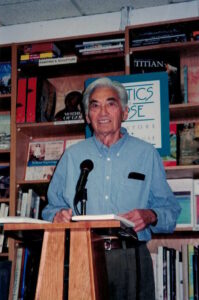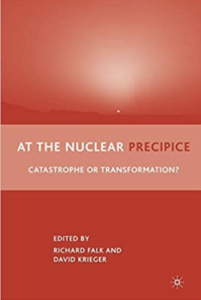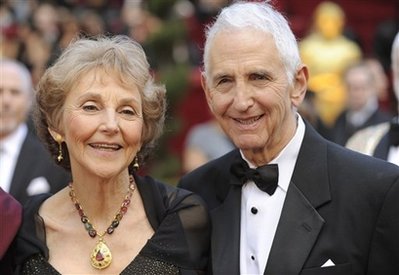Here’s an article on the New York Times site interviewing Daniel about how he would have leaked the Pentagon Papers in the age of the Internet
“The Most Dangerous Man in America: Daniel Ellsberg and the Pentagon Papers” has been nominated for an Oscar in the documentary category, 2010 Academy Awards.
Here is the official trailer:
 I just learned that my friend Howard Zinn died today. Earlier this morning, I was being interviewed by the Boston Phoenix, in connection with the release in Boston February of a documentary in which he is featured prominently. The interviewer asked me who my own heroes were, and I had no hesitation in answering, first, “Howard Zinn.”
I just learned that my friend Howard Zinn died today. Earlier this morning, I was being interviewed by the Boston Phoenix, in connection with the release in Boston February of a documentary in which he is featured prominently. The interviewer asked me who my own heroes were, and I had no hesitation in answering, first, “Howard Zinn.”
Just weeks ago after watching the film on December 7, I woke up the next morning thinking that I had never told him how much he meant to me. For once in my life, I acted on that thought in a timely way. I sent him an e-mail in which I said, among other things, what I had often told others about him: that he was,” in my opinion, the best human being I’ve ever known. The best example of what a human can be, and can do with their life.”
[Interviews and videos of Daniel Ellsberg on Vietnam/Afghanistan parallels posted on The Real News Network]
The Most Dangerous Man in America: Daniel Ellsberg and the Pentagon Papers premieres in the US today. Here are press reviews:
[Daniel’s chapter in Transforming Terror: Remembering the Soul of the World, eds. Susan Griffin and Karin Lofthus Carrington]
Long after the ending of the Cold War, the chance that some nuclear weapons will kill masses of innocent humans somewhere, before very long, may well be higher than it was before the fall of the Berlin Wall.
One phase of the Nuclear Age, the period of superpower arms race and confrontation, has indeed come to a close (though the possibility of all-out, omnicidal exchange of alert forces triggered by a false alarm remains, inexcusably, well above zero). But another dangerous phase now looms, the era of nuclear proliferation and with it, an increased likelihood of regional nuclear wars, accidents, and nuclear terrorism. And the latter prospect is posed not just by “rogue” states or sub-state terrorists but by the United States, which has both led by example for sixty years of making nuclear first-use threats that amount to terrorism and may well be the first or among the first to carry out such threats.
[Daniel’s chapter The Challenge of Abolishing Nuclear Weapons, ed. David Krieger. It was originally presented at The Challenge of Abolishing Nuclear Weapons, a conference organized by the Toda Institute for Global Peace and Policy Research, in partnership with the Nuclear Age Peace Foundation, September, 2007 in San Francisco.]
The chance that some nuclear weapon will kill masses of innocent humans somewhere, before very long, may well be higher than it was before the fall of the Berlin Wall. One phase of the Nuclear Age, the period of superpower arms race and confrontation, has indeed come to a close, for now. But another dangerous phase now looms, the era of nuclear proliferation and with it an increased likelihood of regional nuclear wars and nuclear terrorism. This prospect is enhanced not just by “rogue” states or sub-state terrorists but above all by the United States.
[Daniel’s chapter in At the Nuclear Precipice: Catastrophe or Transformation?, edited by Richard Falk and David Krieger. Originally presented at the 2006 symposium, At the Nuclear Precipice: Nuclear Weapons and the Abandonment of International Law organized by the Nuclear Age Peace Foundation.]
 Long after the ending of the Cold War, the chance that some nuclear weapons will kill masses of innocent humans somewhere, before very long, may well be higher than it was before the fall of the Berlin Wall.
Long after the ending of the Cold War, the chance that some nuclear weapons will kill masses of innocent humans somewhere, before very long, may well be higher than it was before the fall of the Berlin Wall.
One phase of the Nuclear Age, the period of superpower arms race and confrontation, has indeed come to a close (though the possibility of all-out, omnicidal exchange of alert forces triggered by a false alarm remains, inexcusably, well above zero). But another dangerous phase now looms, the era of nuclear proliferation and with it, an increased likelihood of regional nuclear wars, accidents, and nuclear terrorism.
[Drafted and issued by Daniel Ellsberg, April, 1995]
The Non-Proliferation Treaty (NPT) Review and Extension Conference taking place at the United Nations from April 17 to May 12 offers a unique and historic opportunity for global rededication to the goal – expressed in the Treaty – of a world free of nuclear weapons.
We are asking world political and religious leaders, outstanding figures in the arts and sciences, and concerned citizens in every country to participate, by fasting for one day, or more, wherever they are, in a worldwide Fast for the Abolition of Nuclear Weapons during the period of the Conference.
We invite you to join us in this Fast to bring a sense of moral urgency to the decisions being made in our name at the Conference. They will affect the future of humanity and the fate of the earth.

